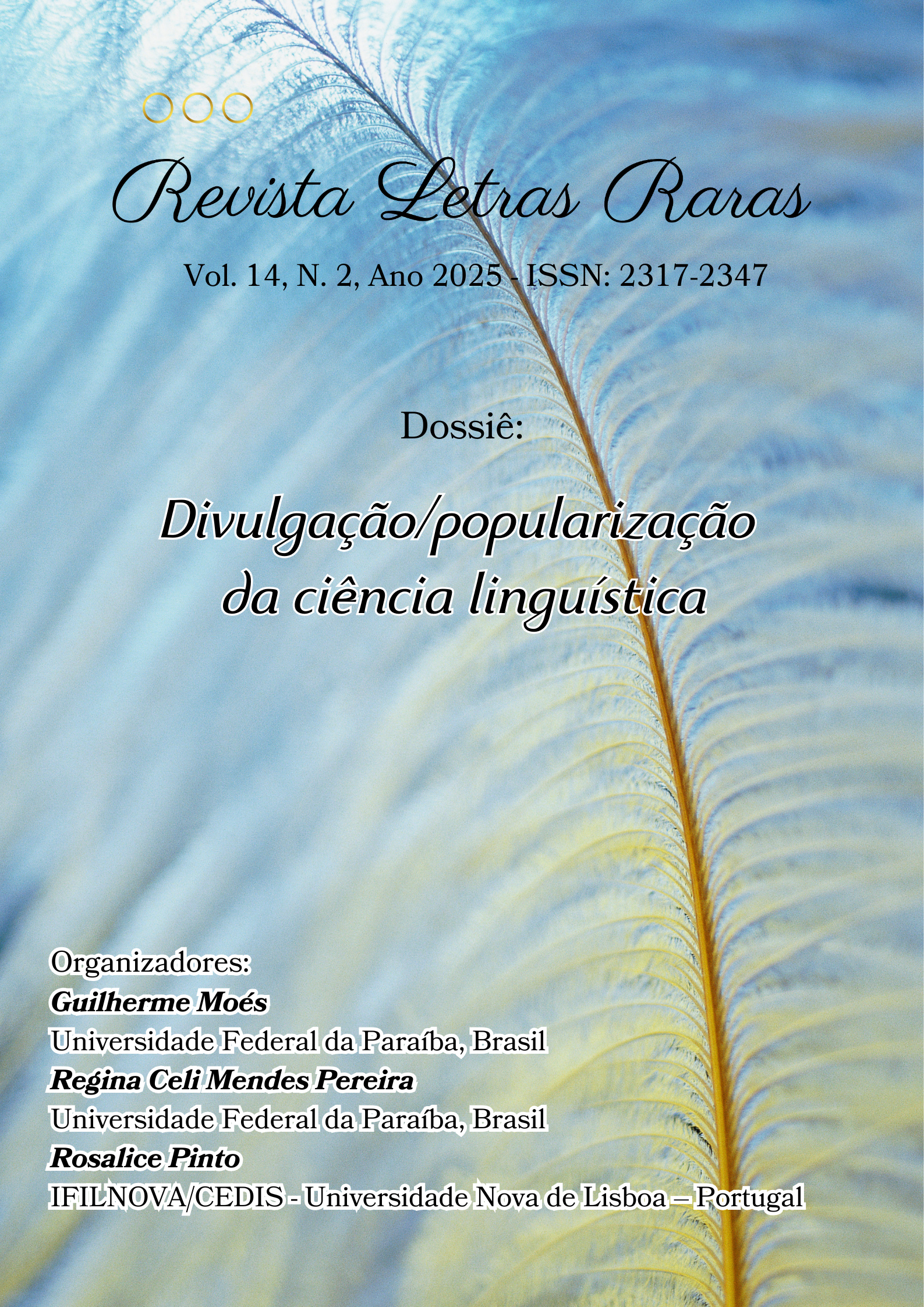The UNESCO World Atlas of Languages as a Tool for Promoting Brazilian Linguistic Diversity
DOI:
https://doi.org/10.5281/zenodo.15708140Palavras-chave:
Scientific Dissemination, Linguistics Popularization, UNESCO Atlas, Linguistic DiversityResumo
The dissemination of scientific knowledge has long been a secondary or even neglected aspect within the academic sphere. To overcome this scenario, scientific dissemination has gradually emerged as a movement for transmitting scientific knowledge in a unidirectional and vertical model, in which the scientist assumes the role of sender and the general public that of receiver. More recently, however, scientific dissemination has progressed toward a dialogical and participatory approach – namely, a bidirectional and horizontal model. The field of Linguistics, however, still faces challenges due to its historical constitution as a science marked by the distancing of those considered laypersons. In this context, UNESCO World Atlas of Languages emerges as an instrument for the popularization of linguistic knowledge, promoting awareness of linguistic diversity and the participation of a previously overlooked public. Thus, this article aims to discuss UNESCO World Atlas of Languages as a tool for the popularization of Linguistics, specifically regarding its methodology of collaborative production between researchers and the non-linguist public – a public that often consists of speakers of marginalized languages under the monolingual conception established and reinforced in Brazil.
Downloads
Referências
ALVES, M. C. dos S.; HANISCH, C. V.; CORDEIRO-OLIVEIRA, S.; GOMES, E. F. de O. Popularização da Linguística na formação de professores no Acre: ensino, pesquisa e extensão. Cadernos de Linguística, v. 3, n. 2, p. 1-23, 2022.
AUTHIER-REVUZ, J. A encenação da comunicação no discurso de divulgação científica. In: Palavras incertas: as não-coincidências do dizer. Trad. E. P. Orlandi et al. Campinas: Ed. da Unicamp, 1998 [1982]. p. 107-131.
BRAMBILLA, S. D. S. Informação legislativa, acesso e cidadania. Em Questão, v. 21, n. 3, p. 106-129, 2015.
BRASIL. Constituição (1988). Constituição da República Federativa do Brasil. Brasília: Senado Federal, 1988.
CATALDI, C. A divulgação da ciência na mídia impressa: um enfoque discursivo. In: GOMES, M. C. A.; MELO, M. S. de S.; CATALDI, C. (Orgs.). Gênero discursivo, mídia e identidade. Viçosa: Ed. UFV, 2007. p. 155-164.
CHARAUDEAU, P. Linguagem e discurso: modos de organização. Coord. da Trad. Angela M. S. Corrêa e Ida Lúcia Machado. São Paulo: Contexto, 2008.
FLORES, N.; GOMES, I. N. O Público da Divulgação Científica no Paradigma da Cultura Participativa. Ação Midiática, n. 7, p. 1-15, 2014.
GRILLO, S. V. de C. Divulgação científica: linguagens, esferas e gêneros. 2013. 333 f. Tese (Doutorado em Filologia e Língua Portuguesa) – Faculdade de Filosofia, Letras e Ciências Humanas, Universidade de São Paulo, São Paulo, 2013.
GRILLO, S. V. de C.; GIERING, M. E.; MOTTA-ROTH, D. Perspectivas discursivas da divulgação/popularização da ciência. Bakhtiniana, v. 11, n. 2, p. 3-13, 2016.
HOCHSPRUNG, V. Divulgação Científica: Notas sobre Popularização da Linguística na Internet e na Sala de Aula. In: SIBALDO, M. A. (Org.). Ensino de línguas: propostas e relatos de experiência. São Paulo: Blucher, 2023. p. 113-130.
MARCUZZO, P. Práticas para a popularização da ciência em Linguística Aplicada. PROLÍNGUA, v. 19, n. 2, p. 59-67, 2025.
MATOS, M. P. S. R. Repositório Brasileiro de Legislações Linguísticas. [Base de dados]. Brasil: Instituto de Investigação e Desenvolvimento em Política Linguística, 29 dez. 2024. Retrieved from: https://direitolinguistico.com.br/repositorio. Acessed on: 17 feb. 2024.
ORGANIZAÇÃO DAS NAÇÕES UNIDAS. Declaração Universal dos Direitos Humanos, 1948. Retrieved from: https://www.unicef.org/brazil/declaracao-universal-dos-direitos-humanos. Acessed on: 17 feb. 2025.
PEREIRA, I. S.; KOSHIYAMA, D. Democratização do acesso à informação científica pela biblioteca do Instituto do Cérebro/UFRN. Revista Brasileira de Biblioteconomia e Documentação, v. 13, p. 1004-1016, 2017.
PICCOLI, M. S. de Q.; STECANELA, N. Popularização da ciência: uma revisão sistemática de literatura. Educação e Pesquisa, v. 49, p. 1-20, 2023.
RABELO, A. O.; SIMAS, H. C. P.; OLIVEIRA, M. de. Políticas linguísticas de proteção das línguas no Amazonas, Brasil. Boletim de Conjuntura (BOCA), v. 20, n. 58, p. 61-83, 2024.
RAJAGOPALAN, K. Por uma Linguística Crítica: linguagem, identidade e a questão ética. São Paulo: Parábola Editorial, 2003.
REIS, J. C. O agente de conhecimento perspectivas no âmbito da tradução do conhecimento na saúde pública. P2P & Inovação, v. 6, n. 1, p. 126-132, 2019.
ROMEIRA, M. F. O Futuro das Línguas no Brasil: Uma análise da Seção Brasileira do Atlas UNESCO das Línguas do Mundo e da Lista de Línguas Brasileiras. 2024. 60 f. Trabalho de Conclusão de Curso (Graduação em Letras) – Centro de Comunicação e Expressão, Universidade Federal de Santa Catarina, Florianópolis, 2024.
HEINEN, A. P.; PENKAL, L. L. Políticas linguísticas e a língua Talian. Uniletras, v. 46, p. 1-19, 2024.
OLIVEIRA, G. M. de. Plurilinguismo no Brasil: repressão e resistência linguística. Synergies Brésil, v. 7, p. 19-26, 2009.
SARATE, K. P. Atlas UNESCO das línguas do mundo: orientações para a seção de línguas brasileiras. Florianópolis: UFSC, 2024. [E-book]. Retrieved from: https://geomultling.ufsc.br/wp-content/uploads/2024/12/Atlas-UNESCO-das-Linguas-do-Mundo.-Orientacoes-para-a-secao-de-Linguas-Brasileiras.pdf. Accessed on: 17 feb. 2025.
ZAMBONI, L. M. S. Cientistas, jornalistas e a divulgação científica: subjetividade e heterogeneidade no discurso da divulgação científica. Campinas: Autores Associados; Fapesp, 2001.
Downloads
Publicado
Como Citar
Edição
Seção
Licença
Copyright (c) 2025 Revista Letras Raras

Este trabalho está licenciado sob uma licença Creative Commons Attribution-NonCommercial 4.0 International License.







